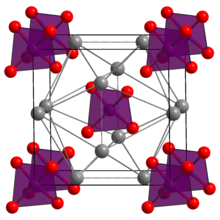Silver phosphate

| |

| |
| Names | |
|---|---|
| IUPAC name
Silver(I) phosphate
| |
| Other names
phosphoric acid, silver(I) salt; argentous phosphate; silver phosphate
| |
| Identifiers | |
3D model (JSmol)
|
|
| ChemSpider | |
| ECHA InfoCard | 100.029.135 |
| EC Number |
|
PubChem CID
|
|
| UNII | |
CompTox Dashboard (EPA)
|
|
| |
| |
| Properties[2] | |
| Ag3PO4 | |
| Molar mass | 418.574 g/mol |
| Appearance | Translucent yellow becomes opaque or discolors when impure. |
| Odor | odorless |
| Density | 6.370 g/cm3 |
| Melting point | 849 °C (1,560 °F; 1,122 K) |
| 0.00065 g/100 mL | |
Solubility product (Ksp)
|
8.89×10−17[1] |
| −120.0·10−6 cm3/mol | |
| Structure | |
| cubic | |
| Hazards | |
| NFPA 704 (fire diamond) | |
| Flash point | non-flammable |
| Safety data sheet (SDS) | Sigma-Alrdich |
Except where otherwise noted, data are given for materials in their standard state (at 25 °C [77 °F], 100 kPa).
| |
Silver phosphate or silver orthophosphate is a light sensitive, yellow, water-insoluble chemical compound composed of silver and phosphate ions of formula Ag3PO4.
Synthesis, reactions and properties
[edit]Silver phosphate is formed as a yellow solid precipitate by the reaction between a soluble silver salt, such as silver nitrate, with a soluble orthophosphate.[3] Its solubility product is 8.89×10−17 mol4·dm−2.[4][5] The precipitation reaction is analytically significant[6] and can be used in qualitative or quantitative analysis.[7]
This compound dissolves in aqueous ammonia.[3] Large crystals of silver phosphate form upon gradual evaporation of such ammoniacal solutions.
Its structure has been confirmed by X-ray crystallography.[8]
Uses
[edit]The precipitation of silver phosphate is useful in traditional analytical chemistry. Precipitation of silver phosphate is also used in silver staining of biological materials (after reduction to silver metal) - as a magnifying agent for phosphate.[9]
Silver phosphate also found use in early photography as a light sensitive agent.[10]
Silver phosphate exhibits antibacterial properties.[11]
Research
[edit]Silver phosphate is a high (90%) quantum yield photocatalyst for the visible light photochemical splitting of water and for production of activated oxygen by the same method.[12]
Other silver phosphates
[edit]Silver pyrophosphate Ag4P2O7 (CAS No. 13465-97-9)[13] can be prepared as a white precipitate from reaction of silver(I) and pyrophosphate ions. Like silver orthophosphate it is light sensitive. Silver orthophosphate turns red on exposure to light.[14] It has a density of 5.306 g/cm3 and a melting point of 585 °C.[15] A hydrate also exists which decomposes at 110 °C.[15]
Silver metaphosphate (AgPO3) (CAS No. 13465-96-8)[16] is a white solid with a density of 6.370 g/cm3 and a melting point of 482 °C. A hydrate also exists which decomposes at 240 °C.[15]
References
[edit]- ^ John Rumble (June 18, 2018). CRC Handbook of Chemistry and Physics (99 ed.). CRC Press. pp. 5–189. ISBN 978-1138561632.
- ^ Weast, Robert C., ed. (1981). CRC Handbook of Chemistry and Physics (62nd ed.). Boca Raton, Florida: CRC Press. p. B-145. ISBN 0-8493-0462-8..
- ^ a b Chisholm, Hugh, ed. (1911). . Encyclopædia Britannica. Vol. 21 (11th ed.). Cambridge University Press. p. 475.
- ^ Ksp solubility constant for common salts www.solubilityofthing.com
- ^ SOLUBILITY PRODUCT CONSTANTS Archived 2012-06-15 at the Wayback Machine www.ktf-split.hr
- ^ Inorganic chemistry, Egon Wiberg, Nils Wiberg, Arnold Frederick Holleman, Academic Press, 2001 p.721 Google Books excerpt
- ^ F.H. Firsching (1961). "Precipitation of Silver Phosphate from Homogenous Solution". Anal. Chem. 33 (7): 873–874. doi:10.1021/ac60175a018.
- ^ R. Masse, I, Tordjman, A. Durif (1976). "Affinement de la Structure Cristalline du Monophosphate d'Argent Ag3PO4. Existence d'une Forme Haute Témperature". Zeitschrift für Kristallographie. 144 (1–6): 76–81. Bibcode:1976ZK....144...76M. doi:10.1524/zkri.1976.144.1-6.76.
{{cite journal}}: CS1 maint: multiple names: authors list (link) - ^ Taichman, R. S.; Hauschka, P. V. (1992). "Effects of interleukin-1? And tumor necrosis factor-? On osteoblastic expression of osteocalcin and mineralized extracellular matrix in vitro" (PDF). Inflammation. 16 (6): 587–601. doi:10.1007/BF00919342. hdl:2027.42/44508. PMID 1459694. S2CID 21949509. Free version
- ^ Cassell's cyclopaedia of photography, Bernard Edward Jones, Ayer Publishing, 1973, p.401 'Phosphate plates and papers', googlebooks link
- ^ Nanocoated film as a bacteria killer 23/1/2009, www.nanowerk.com
- ^ Yi, Z.; Ye, J.; Kikugawa, N.; Kako, T.; Ouyang, S.; Stuart-Williams, H.; Yang, H.; Cao, J.; Luo, W.; Li, Z.; Liu, Y.; Withers, R. L. (2010). "An Orthophosphate Semiconductor with Photooxidation Properties under Visible-Light Irradiation". Nature Materials. 9 (7): 559–564. Bibcode:2010NatMa...9..559Y. doi:10.1038/nmat2780. PMID 20526323.
- ^ Silver pyrophosphate www.chemicalbook.com
- ^ Silver Compounds Archived 2013-12-03 at the Wayback Machine p.5, section 2.22, from Kirk-Othmer Encyclopedia of Chemical Technology, Authors: SAMUEL F. ETRIS (The Silver Institute), C. ROBERT CAPPEL (Eastman Kodak Company), via www.scribd.com
- ^ a b c Bulletin of the National Research Council, National Research Council (U.S.A), 1950, pp.56-57 google books link
- ^ Silver metaphosphate www.chemicalbook.com

